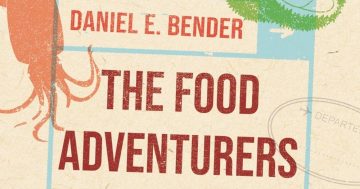Reviewed by Robert Goodman.
By Megan Campisi, Pan Macmillan, $29.99.
 Megan Campisi’s debut novel The Sin Eater takes what she describes as a sliver of truth and weaves it into a rich Elizabethan fantasy. That sliver is that at some point in English history there existed people called sin eaters who would eat bread at a funeral to absolve the dead of their sins. In Campisi’s world there is a detailed accounting of sins, each associated with a different food, and the sin eater’s job is to determine the right foods to be prepared and then eat those foods at the funeral. In fact the book opens with an excerpt from a book that sets out the various foods that are associated with each sin.
Megan Campisi’s debut novel The Sin Eater takes what she describes as a sliver of truth and weaves it into a rich Elizabethan fantasy. That sliver is that at some point in English history there existed people called sin eaters who would eat bread at a funeral to absolve the dead of their sins. In Campisi’s world there is a detailed accounting of sins, each associated with a different food, and the sin eater’s job is to determine the right foods to be prepared and then eat those foods at the funeral. In fact the book opens with an excerpt from a book that sets out the various foods that are associated with each sin.
When the book opens, fourteen year-old May has been caught stealing. Her punishment is to become a sin eater, although why she is chosen for this role becomes clear only much later in the book. Sin eater’s wear a locked collar around their necks and their tongue is branded with an “S”. They are not permitted to talk except when they are hearing the dying recite their sins, and they are generally shunned by the populace. May finds her way to the current sin eater, who takes her in and starts to help her understand her role before an encounter with royalty, and a funeral involving a food for a dark sin that was not confessed, leaves May to fend for herself. May not only has to carry on as sin eater and come to terms with her place in society but also tries to solve the mystery of a series of deaths at the palace that claimed her mentor.
The Sin Eater is set in an alternative Elizabethan era. It is a fantasy but a thinly veiled one that references stand ins for Henry VIII, Elizabeth and Mary and the complex and fraught history of Protestantism and Catholicism. By moving her action to this slightly alternate world, Campisi has control over the dark secrets that drive the plot without being accused of being ahistorical. And this also allows her to fit her sin eaters firmly into the world that she has created But she still manages to capture the mud and dirt and smells of medieval London.
The Sin Eater may be considered by some to be fantasy, but only in the fairy tale sense. While there are accusations of witchcraft there is no magic (or at least no evidence of magic), and the role of the sin eater while religious itself has no particularly magical properties. What this is a finely observed alternate medieval time, with a feisty, relatable main character and a royalty riven by dark secrets. Overall an extremely assured and unique debut.
This and 500 more reviews can be found at www.pilebythebed.com.











